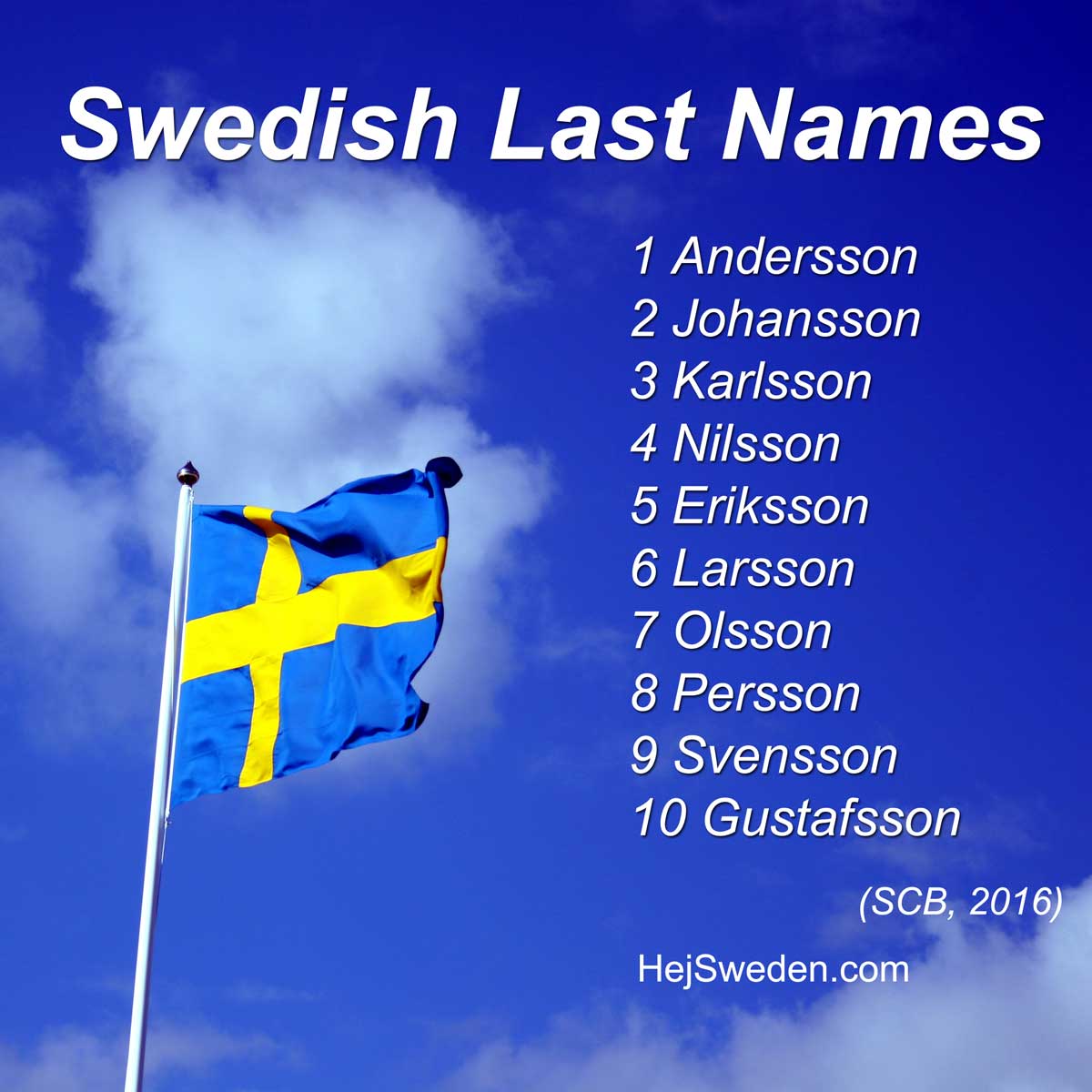Swedish surnames are rich in history and culture, reflecting the traditions and lineage of the Swedish people. This article delves into the fascinating world of Swedish surnames, exploring their origins, meanings, and the unique characteristics that set them apart from surnames in other cultures. Understanding these surnames not only reveals insights into Swedish heritage but also helps individuals trace their ancestry and connect with their roots.
In Sweden, surnames have evolved over centuries, influenced by various factors including geography, occupation, and familial connections. The significance of these names extends beyond mere identification; they encapsulate stories of ancestry, societal norms, and historical events. This guide aims to provide readers with a thorough understanding of Swedish surnames, including their historical context, common naming conventions, and notable examples.
As we navigate through the intricacies of Swedish surnames, we will also highlight their relevance in today's society and how they continue to shape the identities of individuals and families. Whether you are a history enthusiast, a genealogist, or simply curious about Swedish culture, this article promises to offer valuable insights and information.
Table of Contents
- 1. History of Swedish Surnames
- 2. Common Naming Conventions
- 3. Surnames by Region
- 4. The Meaning Behind Swedish Surnames
- 5. Notable Swedish Surnames
- 6. Tracing Your Ancestry with Surnames
- 7. Modern Usage of Swedish Surnames
- 8. Conclusion
1. History of Swedish Surnames
Swedish surnames have a rich history that dates back to the Middle Ages. Initially, surnames were not hereditary; instead, they were often based on the individual's father’s name, occupation, or geographical location. This practice is known as patronymic naming, where a child would take on the first name of the father followed by “-son” or “-dotter” (meaning son or daughter, respectively).
For example, if a man named Erik had a son named Johan, the child would be referred to as Johan Eriksson. This system not only indicated lineage but also helped to identify individuals within a community. Over time, as populations grew and communities became more complex, the need for fixed surnames became apparent. By the 19th century, most Swedes adopted permanent surnames, often based on the original patronymic form.
Key Historical Events Influencing Surnames
- The introduction of the nobility and their titles in the 16th century.
- The adoption of the Swedish surname law in 1901, which required families to adopt fixed surnames.
- The influence of immigration and globalization on naming practices in the 20th century.
2. Common Naming Conventions
In Sweden, naming conventions have specific rules and patterns that are often followed. The patronymic naming system is still evident in many surnames, but there are also other conventions to note.
Patronymic and Matronymic Names
As mentioned earlier, patronymic names are derived from the father's name with the addition of “-son” or “-dotter.” Matronymic names, while less common, are derived from the mother’s name and can be identified by the suffix “-dotter.”
Geographical and Occupational Surnames
Many Swedish surnames reflect geographical locations or occupations. For instance, “Lindgren” may refer to someone living near a linden tree, while “Karlsson” could indicate a carpenter. Understanding these conventions provides deeper insights into the lineage and background of individuals.
3. Surnames by Region
Sweden is divided into several regions, each with its unique cultural and historical influences. As a result, certain surnames may be more prevalent in specific areas.
Common Surnames in Different Regions
- In Northern Sweden: Names like “Berglund” and “Norrström” are common.
- In Southern Sweden: You might find names such as “Svensson” and “Johansson” more frequently.
4. The Meaning Behind Swedish Surnames
The meanings of Swedish surnames can provide fascinating insights into the history and culture of the country. Many surnames are derived from natural elements, professions, or personal characteristics.
Examples of Meaningful Surnames
- Lindström: Meaning "linden stream," indicating a geographical feature.
- Andersson: Meaning "son of Anders," following the patronymic tradition.
5. Notable Swedish Surnames
Certain Swedish surnames have gained prominence through historical figures, artists, and influencers. These names often carry significant weight in Swedish culture.
Famous Personalities with Swedish Surnames
- ABBA: The iconic pop group, highlighting the surname of band members.
- Selma Lagerlöf: The first female writer to win the Nobel Prize in Literature.
6. Tracing Your Ancestry with Surnames
For those interested in genealogy, understanding Swedish surnames is crucial for tracing family lineage. Various resources are available for individuals looking to explore their ancestry.
Resources for Genealogy Research
- Swedish Church Records
- National Archives of Sweden
- Online Genealogy Databases
7. Modern Usage of Swedish Surnames
Today, Swedish surnames continue to evolve as society changes. While many families retain traditional surnames, others have adopted new naming practices influenced by modern culture.
Impact of Globalization on Surnames
Globalization has led to increased intercultural marriages, resulting in the blending of surnames and the emergence of new naming conventions. This reflects a more interconnected world where names carry diverse meanings and histories.
8. Conclusion
In conclusion, Swedish surnames offer a captivating glimpse into the country’s history, culture, and lineage. By understanding the origins, meanings, and conventions of these names, individuals can appreciate their significance in today’s society. We encourage readers to explore their own surnames and consider how they connect to their heritage.
If you found this article informative, please leave a comment below, share it with others, or check out our other articles for more insights into Swedish culture and history!
Thank you for taking the time to explore the fascinating world of Swedish surnames with us. We hope to see you again soon for more insightful content!
Exploring The Allure Of Playboy Centerfolds: A Comprehensive List And Analysis
Exploring The Life Of Adam Driver's Wife: A Journey Into The Heart Of A Star
Why Are Cops Called Cops? Unraveling The Origins And Meaning Behind The Term


